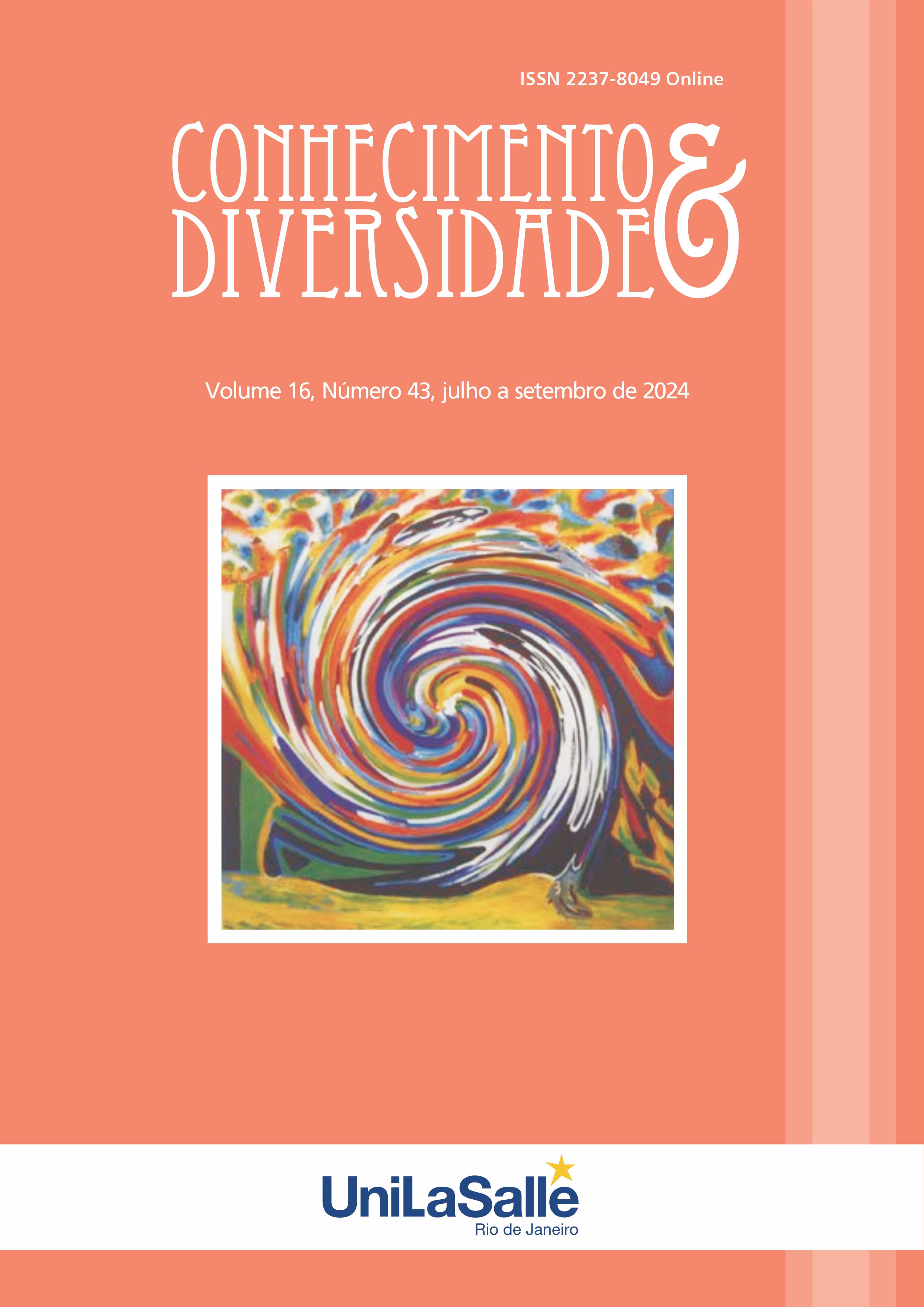EDUCAÇÃO SUPERIOR
RECURSOS INTEGRATIVOS DOS SISTEMAS NACIONAIS (MODELO DE INFORMAÇÃO E COMUNICAÇÃO)
DOI:
https://doi.org/10.18316/rcd.v16i43.11881Palavras-chave:
Ensino superior, Ensino a distância, Tecnologias de informação e comunicação, IntegraçãoResumo
As restrições de quarentena relacionadas à pandemia da COVID-19 também deram impulso ao uso dos benefícios da digitalização para melhorar o setor educacional. O objetivo do artigo é caracterizar a importância das tecnologias de informação e comunicação pelo prisma da integração dos sistemas educacionais nacionais. A base metodológica do estudo foi uma pesquisa por questionário com professores de instituições de ensino superior da Ucrânia, cujos resultados foram processados com o uso de análise de sistema, método de prognóstico e comparação. Nos resultados, foram observadas as tendências gerais e os fundamentos da integração dos sistemas nacionais de ensino superior nos países da União Europeia. O potencial integrativo das formas de informação e comunicação da organização educacional no mundo moderno também é enfatizado. Foi estabelecido que as TICs contribuem para o desenvolvimento de várias direções e funções da educação. Em particular, elas aumentam a acessibilidade da educação, melhoram o suporte organizacional, material e técnico e contribuem para o surgimento de novas oportunidades na escolha de uma trajetória de educação orientada para o indivíduo. As conclusões enfatizam que a maioria absoluta dos professores está convencida de que as TIC são uma condição necessária para o trabalho moderno.
Referências
Abbasimehr, H., Paki, R., & Bahrini, A. (2021). A novel approach based on combining deep learning models with statistical methods for COVID-19 time series forecasting. Neural Computing and Applications, 34(4), 3135-3149. https://doi.org/10.1007/s00521-021-06548-9
Avby, G. (2022). An integrative learning approach: Combining improvement methods and ambidexterity. The Learning Organization. https://doi.org/10.1108/tlo-10-2021-0127
Bader, S., Oleksiienko, A., & Mereniuk, K. (2022). Digitalization of future education: analysis of risks on the way and selection of mechanisms to overcome barriers (Ukrainian experience). Future Education, 2(2), 21-33. https://doi.org/10.57125/FED/2022.10.11.26
Bakhmat, N., Kruty, K., Tolchieva, H., & Pushkarova, T. (2022). Modernization of future teachers' professional training: on the role of immersive technologies. Future Education, 2(1), 28-37. https://doi.org/10.57125/FED/2022.10.11.22
Datta, S., Dey, S., Acharya, A., & Datta, D. (2021). Blended learning. In Digital pedagogies and the transformation of language education (pp. 227-249). IGI Global. https://doi.org/10.4018/978-1-7998-6745-6.ch012
Huda, O. (2023). Use of the Moodle Platform in Higher Education Institutions During Training Masters: Experience Under Martial Law. E-Learning Innovations Journal, 1(2), 4–20. https://doi.org/10.57125/ELIJ.2023.06.25.01
Järvis, M., Tambovceva, T., & Virovere, A. (2021). Scientific innovations and advanced technologies in higher education. Future Education, 1(1), 13-22. https://doi.org/10.57125/FED.2022.10.11.2
Kekoni, T., Kainulainen, A., Tiilikainen, E., Mäki-Petäjä-Leinonen, A., Mönkkönen, K., & Vanjusov, H. (2022). Integrative learning through the interdisciplinary Social Law Clinic - learning experiences of law and social work students. Social Work Education, 1-15. https://doi.org/10.1080/02615479.2022.2102163
Linhares Ponte Filho, M. H. (2020). Information and communication technologies in education. International Journal for Innovation Education and Research, 8(8), 541-550. https://doi.org/10.31686/ijier.vol8.iss8.2560
Malaniuk, N. (2020). Innovative pedagogical technologies in professional education. Pedagogy of the Formation of a Creative Person in Higher and Secondary Schools, 3(70), 113-118. https://doi.org/10.32840/1992-5786.2020.70-3.21
Milanković Jovanov, J., Ivkov-Džigurski, A., Stanisavljević, J., Ivanović Bibić, L., D. Petrović, M., & Đukičin Vučković, S. (2022). Is the integrative teaching approach beneficial for learning? International Journal of Cognitive Research in Science, Engineering and Education, 10(2), 173-183. https://doi.org/10.23947/2334-8496-2022-10-2-173-183
Prokopenko, O. (2021). Technological challenges of our time in the digitalization of the education of the future. Future Education, 1(2), 4-13. https://doi.org/10.57125/FED/2022.10.11.14
Rak-Młynarska, E. (2022). Analysis of trends in the development of the educational environment: education of the future. Future Education, 2(2), 4-13. https://doi.org/10.57125/FED/2022.10.11.24
Rani, G., Kaur, P., & Sharma, T. (2022). Digital education challenges and opportunities. Journal of Engineering Education Transformations, 35(4), 121-128. https://doi.org/10.16920/jeet/2022/v35i4/22111
Sarasola Sánchez-Serrano, J. L., Jaén-Martínez, A., Montenegro-Rueda, M., & Fernández-Cerero, J. (2020). Impact of the information and communication technologies on students with disabilities. A systematic review 2009-2019. Sustainability, 12(20), 8603. https://doi.org/10.3390/su12208603
Stosic, L., Dermendzhieva, S., & Tomczyk, L. (2020). Information and communication technologies as a source of education. World Journal on Educational Technology: Current Issues, 12(2), 128-135. https://doi.org/10.18844/wjet.v12i2.4815
Sun, Y. (2022). Teaching of dance choreography course based on multimedia network environment. Journal of Environmental and Public Health, 1-10. https://doi.org/10.1155/2022/8627822
Sushchenko, T. I. (2019). Extracurricular pedagogy as an important component of pedagogical studies. In Innovative technologies in training and education (pp. 84-102). Liha-Pres. https://doi.org/10.36059/978-966-397-174-2/84-102
Tsekhmister, Y. V., Kotyk, T. M., Matviienko, Y. S., Rudenko, Y. A., & Ilchuk, V. V. (2021). La efectividad de la tecnología de realidad aumentada en la educación STEAM. Apuntes Universitarios, 12(1), 250-267. https://doi.org/10.17162/au.v11i5.932
Zahorodna, O., Saienko, V., Tolchieva, H., Tymoshchuk, N., Kulinich, T., & Shvets, N. (2022). Developing communicative professional competence in future economic specialists in the conditions of postmodernism. Postmodern Openings, 13(2), 77-96. https://doi.org/10.18662/po/13.2/444
Zhao, Q. J., Cupido, N., Whitehead, C. R., & Mylopoulos, M. (2022). What role can education play in integrated care? Lessons from the ECHO (Extensions for Community Health Outcomes) Concussion program. Journal of Integrated Care. https://doi.org/10.1108/jica-01-2022-0012
Downloads
Publicado
Edição
Seção
Licença
Copyright (c) 2024 Olena Kaidanovska, Mariia Pymonenko, Oksana Morklyanyk, Oksana Iurchyshyn, Yaroslav Rakochyi

Este trabalho está licenciado sob uma licença Creative Commons Attribution 4.0 International License.
Conforme recomendado pelo o Public Knowledge Project, a RCD adota para seus artigos uma licença CREATIVE COMMONS: Atribuição CC BY 4.0.
Esta licença permite que outros distribuam, remixem, adaptem e construam sobre o seu trabalho, mesmo comercialmente, desde que lhe dêem crédito pela criação original.
Esta é a licença mais adequada oferecida.
Recomendado para a máxima divulgação e uso de materiais licenciados.



